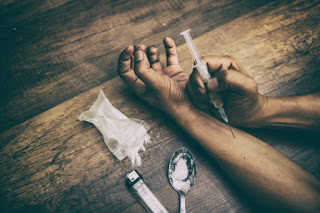Another deal, another compromise, a charade, for a government who don’t give a shit about a war that should be fighting, to go on pretending they are winning it, but it cannot be won and it will never be won. At least not until police see it for what it is. None till they know what is the truth.
Yes, I am talking about the war on drugs trade in Goa. The government appears to be in denial, and the opposition, regrettably, speaks with forked tongues, often depending on which side of the political fence they stand. Meanwhile, the police, instead of addressing the issue head-on, often resort to pointing fingers at the public. This, despite their own awareness that some among their ranks are not only involved in the drug trade but also facilitate and protect it.
Director General of Police Jaspal Singh's recent statement, "locals, outsiders, and foreigners are in the drug trade," is hardly news to anyone in Goa. It's an open secret. However, the question that hangs in the air like a heavy cloud is, what is the police department doing to combat this issue? How has such a thriving drug trade flourished right under their noses? How many within their own ranks are complicit? Why have significant quantities of drugs and narcotic substances mysteriously vanished from police custody? Why have drug kingpins in Goa named police personnel in their nefarious activities? And how do narcotics find their way into the hands of undertrials in our jails?
These are just a few of the many questions that demand answers regarding the functioning of the police department. Director General Jaspal Singh must acknowledge that his department has been infiltrated by corrupt police personnel and politicians, a toxic blend that has eroded its credibility.
Pointing fingers at the local population, outsiders, and foreigners only serves to make a laughing-stock of the police force. Even counterparts in Hyderabad recognize that the Goa police department, far from combating the drug trade, often functions as a protector for drug kingpins, peddlers, and their couriers. This is evident in the numerous drug raids conducted by Hyderabad police on Goan soil, leading to the apprehension of traffickers who operated with apparent impunity.
It is disheartening that the police's response to bail applications for individuals arrested for drug possession often hinges on the need to extract the names of their suppliers. The courts, however, frequently grant bail, raising the pertinent question of what the police have been doing during the 10-14 days these accused individuals were in their custody.
Jaspal Singh, undoubtedly an intelligent and upright police officer, has a track record of using his investigative skills to solve complex cases. However, as the head of the police department, his loose and at times, irresponsible statements expose the frustrations of working under the current administration. It's almost as if he's conveying to the public that he is merely a figurehead within the department, with his powers overshadowed by the Home minister, who ironically also serves as the non-Goan Chief Minister of Goa, Pramod Sawant.
Nevertheless, drugs and narcotic substances will continue to be available as long as there is a demand. This is where the police come in – to gather intelligence, strategize, and dismantle drug networks and routes, all while creating a network of informants. Furthermore, thorough investigations should lead to airtight cases, ensuring that those apprehended with drugs face substantial convictions and lengthy sentences.
However, this ideal scenario is not playing out on the ground. Police personnel, particularly those assigned to the Narcotic Cell, are under immense pressure to meet yearly targets. These targets include the number of raids conducted, the number of arrests made, and the number of NDPS (Narcotic Drugs and Psychotropic Substances) cases registered. In pursuit of these numbers, some officers resort to harassment and threats against drug peddlers and suspects, damaging their potential to become valuable informants over time.
In conclusion, Director General of Police Jaspal Singh must address the failures within his department without deflecting blame onto the public. It is essential to remember that the very public he points fingers at is the one that funds his salary and, more importantly, places its trust in the police to uphold the law and protect the community. Accountability and a renewed commitment to combating the drug trade are urgently needed to restore public faith in the police force and bring justice to a state battling a serious drug epidemic.


No comments:
Post a Comment